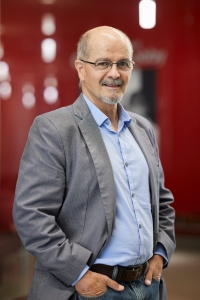
Professor
Gallogly Chair in Engineering #1 of Chemical Engineering
George Lynn Cross Professor
Email: resasco@ou.edu
Phone: (405) 325-4370
Office: Sarkeys Energy Center, Room T-327
Website
Google Scholar
Education
Ph.D. Chemical Engineering (1984)
Yale University
B.S. Chemical Engineering (1975)
Universidad Nacional del Sur, Argentina
Research Focus
Experience and Awards
About
Daniel Resasco obtained his PhD (1984) from Yale University. He specializes in heterogeneous catalysis and nanostructured materials. Author of 330+ publications and 40+ industrial patents. His work has been cited more than 33,000 times and his h-index is 95. Resasco has received numerous awards for his work on heterogeneous catalysis and nanotube synthesis, including the Exceptional Achievements in Catalysis of the Catalysis Division from the American Chemical Society; the Anderson Catalysis Award from the Chemistry Institute of Canada; the Excellence in Catalysis Award from the Catalysis Society of Metropolitan New York; the Great Plain Catalysis Society Award; the Bakhshi Lectureship Award, University of Saskatchewan, Canada; the Catalysis Club of Philadelphia Award; the Oklahoma Chemist of the Year. American Chemical Society (ACS). He is a fellow of the American Institute of Chemical Engineering (AIChE) and the Oklahoma Higher Education Hall of Fame, a member of the National Academy of Inventors (NAI), a member of the National Academy of Sciences of Argentina, the Inaugural Gallogly Chair of Engineering, and the D. Bourne Chair of Chemical Engineering. He is inventor of a nanotube production process (CoMoCAT) and founder of SouthWest Nanotechnology. Resasco is editor of Catalysis Reviews and has been editor of Journal of Catalysis, as well as member of the editorial boards of Journal of Catalysis, Applied Catalysis A, Applied Catalysis B, Chinese J. Catalysis, and Catalysis Reviews. He has been Chair of the Catalysis Division of the American Chemical Society, President and co-founder Great Plains Catalysis Society.
The goal of Resasco’s research is to understand the relationship between the catalytic performance and the microscopic structure and composition of the material, in addition to the links between the synthesis process and the final catalyst. Achieving this goal requires a combination of studies involving materials synthesis, characterization of materials under reaction conditions, and precise measurement of the catalytic behavior (detailed kinetics, obtained under carefully controlled reaction conditions to properly account for parasitic effects, such as mass transfer limitations) . In this interdisciplinary effort, a variety of techniques is employed, including surface spectroscopies (DRUV-VIS, FTIR), x-ray absorption (EXAFS, XANES), X-ray diffraction, microcalorimetry, electron microscopy, resonance techniques, and temperature programmed methods (TPD, TPR, TPO), "in situ" Raman spectroscopy, together with steady-state and transient catalytic activity measurements. A closely collaboration with experts in theoretical model allows Resasco’s group to develop atomistic reaction mechanisms based in the combination of theory and experiments.
Investigations are conducted on a variety of materials- zeolites, supported metals, and strong solid acids. These fundamental studies are designed to be applicable to industrial processes in several areas: